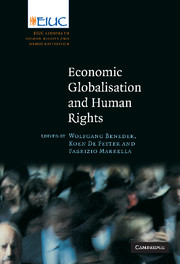Book contents
- Frontmatter
- Contents
- List of contributors
- Series editors' preface
- Preface
- List of abbreviations
- Introduction
- PART I Inter-disciplinary Perspectives on Human Rights and Economic Globalisation
- Economic Globalisation, Globalist Stories of the State, and Human Rights
- Towards a Theory of Global Ethics in Support of Human Rights
- Localising Human Rights
- Globalisation and Social Rights
- PART II The Relevance of Human Rights for International Economic Organisations
- PART III International Corporate Accountability
- Index
Towards a Theory of Global Ethics in Support of Human Rights
Published online by Cambridge University Press: 09 July 2009
- Frontmatter
- Contents
- List of contributors
- Series editors' preface
- Preface
- List of abbreviations
- Introduction
- PART I Inter-disciplinary Perspectives on Human Rights and Economic Globalisation
- Economic Globalisation, Globalist Stories of the State, and Human Rights
- Towards a Theory of Global Ethics in Support of Human Rights
- Localising Human Rights
- Globalisation and Social Rights
- PART II The Relevance of Human Rights for International Economic Organisations
- PART III International Corporate Accountability
- Index
Summary
‘Linking human rights with ethics and globalisation represents a connection whose time has come. And yet the task is daunting.’
Mary Robinson, 2002Introduction
The vision articulated by Mary Robinson, then UN High Commissioner for Human Rights, in a lecture presented at the University of Tübingen in January 2002, epitomises an important turn in the contemporary concept of international human rights. This is the close linking of human rights with a project of global ethics, indeed the framing of human rights as a vehicle and expression of a global ethic.
A predominant feature of international relations in the post-World War II era is the codification of human rights in the form of international law. Following the adoption of the Universal Declaration of Human Rights (UDHR) in 1948, the International Convention Against All Forms of Racial Discrimination (ICERD), the International Covenant on Civil and Political Rights (ICCPR), the International Covenant on Economic, Social and Cultural Rights (ICESCR), the International Convention Against All Forms of Discrimination Against Women (ICEDAW), the Convention Against Torture (CAT), and the Convention on the Rights of the Child (CRC) all mark milestones in a process of human rights standard-setting, which has now been largely accomplished, if not entirely completed. Parallel developments have occurred in a regional context in Europe, the Americas, and Africa with the European Convention on Human Rights (ECHR), the American Convention on Human Rights (ACHR), and the African Charter on Human and Peoples' Rights (ACHPR), respectively.
- Type
- Chapter
- Information
- Economic Globalisation and Human RightsEIUC Studies on Human Rights and Democratization, pp. 39 - 66Publisher: Cambridge University PressPrint publication year: 2007

